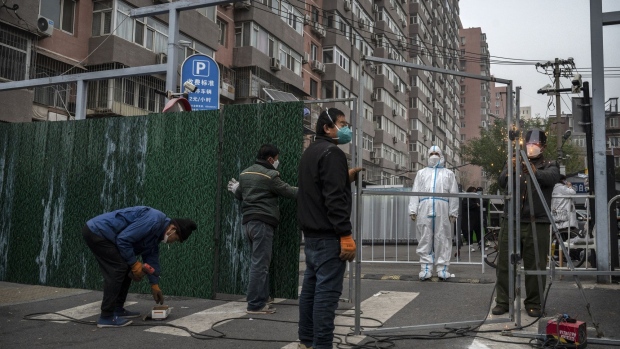Nov 25, 2022
Fear of Quarantine Camps, Not Covid, Is Shutting Beijing Down
, Bloomberg News

(Bloomberg) -- There are serious ramifications to being exposed to Covid-19 in China -- and it’s not infection. As the country confronts its biggest outbreak ever, residents in major cities are hunkering down because of the prospect of being sent to a quarantine camp or locked down at home.
Going out in the capital of Beijing means having to scan a QR code to enter venues like shops and restaurants, or take public transportation. Under the country’s ubiquitous contract-tracing surveillance system, visiting the same places as someone who later turns up infected can land you in a quarantine facility, where conditions are so poor that some people say they are buying chamber pots and portable tents at the prospect.
That’s why the capital has largely battened down. People are staying at home as transmission increases, even though the overall risk of infection remains low, with 1,854 cases reported for the city of 22 million people on Thursday.
“I’m not scared of getting infected at all,” said Liu, a 36-year old who works in the media industry. “I’m in fear of getting locked down or even sent to a quarantine facility. There’s a higher chance I end up there if I scan those codes to get into public venues.”
Liu hasn’t done any in-person shopping during the current Covid wave in Beijing.
“Look at how many people are under lockdown now,” she said. “Everyone worries about it.”
The food situation in the city underscores the point. Shops are stocked, with plentiful fruits, vegetables and non-perishable items that residents might need during a lockdown. But they are also largely devoid of shoppers.
There are surging orders for home delivery on apps from companies like Alibaba Group Holding Ltd.’s Freshippo, many of which are now overwhelmed. The soonest delivery dates are a month out, if they are available at all.
The isolation is easy to see along Beijing’s roads, deserted even during rush hour, and on public transportation, where subway ridership has plummeted.
Few people are out and about. Shopping districts, normally teeming with people, are empty. Many schools have closed, eating inside restaurants is no longer allowed and public entertainment venues are luring few visitors.
Cheng, a 32-year-old businessman, canceled his plans to go to Beijing’s Universal Studio on Friday. He said scanning multiple codes for taxis and park entry would be too risky for him.
“Even there’s no case, they could put me into some sort of quarantine if they later identify me as a close contact in this ‘journey,’” he said. “It’s just not worth it.””
While local officials are shutting down apartment buildings block by block, no sweeping measures have been declared. The country’s top leaders released a new Covid playbook two weeks ago, outlining 20 measures to guide the response to the pandemic that focused on refining the approach and using targeted restrictions to minimize the economic disruption from fighting the virus.
Getting the current flareup under control to meet the dynamic Covid Zero requirements without the proven, heavy-handed measures that quelled earlier outbreaks has been a challenge. But almost three years after the pandemic began, the major concern for many Chinese people has shifted from the virus to the collateral risks that stems from how one is treated if they become infected or are a close contact.
While a formal lockdown of all of Beijing seems unfathomable, given its position and obligations as the seat of the government, the creeping curbs and escalating restrictions are already having an impact. The reluctance of citizens to put themselves at risk of encountering the virus is certainly helping keeping a lid on the size of the outbreak.
China continues send every infected person, and all of their close contacts, to quarantine facilities. Those numbers are rising across the country, where cases just surpassed 30,000 a day for the first time during the pandemic. And cities are responding by building makeshift hospitals and converting convention centers into isolation facilities.
Testing, which has been embraced to track the virus across China, now is starting to get short shrift from some in Beijing who worry about their exposure while getting the results often needed to conduct daily life. Since they aren’t eating in restaurants, going shopping or taking public transportation, the testing queue may be the busiest activity of the day.
“Don’t get tested if you don’t need to go out,” one Beijing resident wrote on social media. “Getting a Covid test is now the biggest chance to get infected or put yourself at risk.”
©2022 Bloomberg L.P.


